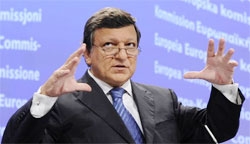EU mulls 'coordinated' bank recapitalisation
 |
| European Commission President Jose Manuel Barroso has said the EU executive is proposing "coordinated action" by the 27 European Union states to recapitalise banks. |
"We are now proposing to the member states to have a coordinated action to recapitalise banks and get rid of toxic assets they may have," the head of the EU executive Commission Jose Manuel Barroso said in an interview with Euronews TV.
Referring to a "real mess" in the eurozone, Barroso joined calls for banks to be recapitalised to help stem the debt crisis.
"Recapitalisation efforts are well underway, additional efforts may be needed. Coordination at European level is of course essential," he told reporters later.
Stock markets rose as all eyes turned to Berlin where the European Central Bank held its key interest rates steady, ahead of talks hosted by German Chancellor Angela Merkel with top officials.
European shares rallied on renewed hopes of a resolution to the debt crisis while Asia's stock markets also surged, boosted by another strong performance on Wall Street overnight and buoyed by better-than-expected US economic data.
Merkel was to host talks on threats to the financial global system later Thursday, to include Christine Lagarde, head of the International Monetary Fund, as well as the chiefs of the World Bank, OECD and G20 representatives.
Also attending will be European Central Bank chief Jean-Claude Trichet, who chaired the last meeting of his eight-year term with central bank chiefs from the 17 eurozone countries in Berlin.
The ECB voted to leave the rate for its main refinancing operations unchanged at 1.5 per cent, but announced refinancing operations of approximately one year to support bank sector funding and head off a credit crunch.
Earlier, the Bank of England similarly held its interest rates at a record low, but decided to pump out another £75 billion ($115 billion, 87 billion euros) of stimulus under its quantitative easing policy.
The euro eased slightly against the dollar in reaction to the ECB announcement, slipping to 1.3280 dollars from 1.33 dollars previously and stock markets also erased some of the strong gains seen earlier in the day.
Merkel said in Brussels Wednesday that helping the banks was "justified, if we have a joint approach" giving nervous financial markets an immediate boost after days of heavy losses.
The statement came after France and Belgium were forced to leap to the rescue of cross-border bank Dexia, the first European bank to be dragged down by the eurozone debt crisis -- and which also had to be bailed out in 2008.
The debt crisis that began in Greece, snaring Ireland and Portugal on the way and now threatening Italy and Spain, is putting at risk the whole euro project as banks exposed to sovereign debt find it impossible to raise funding.
The resulting "credit crunch" has sparked warnings of a possible replay of 2008 when US investment bank Lehman Brothers collapsed, almost taking the global financial system down with it, but for massive government support.
Official data in Frankfurt showed eurozone banks continued to deposit large amounts of overnight funds at the ECB, a signal that banks are wary of lending to each other.
Merkel said that it "is important for the markets that we achieve results ... time is pressing and we have to act quickly".
Germany, she said, was ready to show the way, putting fresh capital into its banks if necessary, while adding that there was no "magic wand" at Europe's disposal to resolve its problems.
IMF Europe director Antonio Borges said that "somewhere between 100-200 billion (euros) will be more than enough" to back up the banks, adding it was "not that much money ... by no means beyond reach".
But Spanish Finance Minister Elena Salgado, whose country has pumped 18 billion euros into restructuring banks over the past few years, said Thursday that Madrid wouldn't pick up the tab anymore in order to focus on its reducing its deficit.
Asked to comment on how EU authorities had allowed the sovereign debt crisis to get out of hand, Barroso said: "In fact the European Commission has always warned about the high levels of debt in our member states."
But "probably not so vigorously as we should," he admitted.
Greek Prime Minister George Papandreou was due to meet his ministers to discuss the crisis Thursday ahead of the arrival of German Economy Minister and Vice Chancellor Philipp Roesler the same evening.
Civil servants staged a 24-hour walkout Wednesday in protest at a government plan to sideline 30,000 staff to reduce the deficit in return for the next installment of debt rescue funding.
The Netherlands was also due Thursday to vote on expanding the European Financial Stability Facility, the EU's bailout fund.
What the stars mean:
★ Poor ★ ★ Promising ★★★ Good ★★★★ Very good ★★★★★ Exceptional
 Tag:
Tag:
Related Contents
Latest News
More News
- Cashless payments hit 28 times GDP in 2025 (February 04, 2026 | 18:09)
- SSIAM and DBJ launch Japan Vietnam Capital Fund (February 04, 2026 | 15:57)
- Banks target stronger profits, credit growth in 2026 (February 04, 2026 | 15:43)
- Vietnam on path to investment-grade rating (February 03, 2026 | 13:07)
- Consumer finance sector posts sharp profit growth (February 03, 2026 | 13:05)
- Insurance market building the next chapter of protection (February 02, 2026 | 11:16)
- NAB Innovation Centre underscores Vietnam’s appeal for tech investment (January 30, 2026 | 11:16)
- Vietnam strengthens public debt management with World Bank and IMF (January 30, 2026 | 11:00)
- Corporate bond market poised for stronger growth cycle (January 28, 2026 | 17:13)
- Vietnam's IPO market on recovery trajectory (January 28, 2026 | 17:04)






















 Mobile Version
Mobile Version